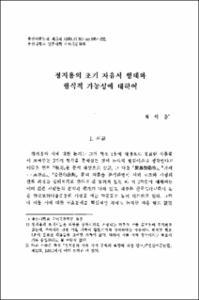재외동포의 법적 지위
- Alternative Title
- The Legal Status of the Korean Compatriots in Foreign Countries
- Abstract
- 「재외동포지위법」 의 제정은 560만명이라는 세계적으로 많은 수의 재외동포룰 가지고 있는 우리 나라의 경우 민족정책을 수립하고 집행한다는 차원에서 바람직한 것이었다고 생각된다. 이 법률의 제정에 따라 거주자인 국민과 재외국민간에 불평등하였던 관계가 다소 완화되었고, 외국국적동포들의 출입국과 국내 경제활동의 자유가 상당히 신장되기는 하였지만, 법적으로는 법적 지위, 즉 권리ㆍ의무관계가 서로 다른 여러 집단들이 생겨나게 되었다는 새로운 현상도 나타나게 되었다.
그러나 당초의 의도와는 달리 재중국 · 재러시아권동포를 적용대상에서 배제하였고, 법적지위를 규정함에 있어서도 참정권은 배제한 채 경제거래의 자유를 중심으로 규정하였으며, 외국인을 혈통에 따라 구분하여 차별함으로써 부분적, 한시적, 차별적 법률이 되었다는 문제점을 남겼다.
Korea has about 5 millions and 600 thousands of compatriots in foreign countries. So it seemed to be desirable that "Law on the Legal Status of Korean Compatriots in Foreign Countries" was enacted in order to establish and execute a policy of Korean nation.
This law makes it possible that inequality between people in Korea and those in abroad be reduced, freedom of immigration and economic freedoms of Korean compatriots with foreign nationalities be enlarged, and various groups of Korean people with different legal status - relationship between rights and duties - appear.
But this law shows some problems: Korean compatriots in China and in Russian area are excluded from application of the law; political rights of Korean people in foreign countries are exempted from the law; the law discriminates the foreigners by their bloodline. At last this law has a problem of partial, tentative and discriminative nature.
Korea has about 5 millions and 600 thousands of compatriots in foreign countries. So it seemed to be desirable that "Law on the Legal Status of Korean Compatriots in Foreign Countries" was enacted in order to establish and execute a policy of Korean nation.
This law makes it possible that inequality between people in Korea and those in abroad be reduced, freedom of immigration and economic freedoms of Korean compatriots with foreign nationalities be enlarged, and various groups of Korean people with different legal status - relationship between rights and duties - appear.
But this law shows some problems: Korean compatriots in China and in Russian area are excluded from application of the law; political rights of Korean people in foreign countries are exempted from the law; the law discriminates the foreigners by their bloodline. At last this law has a problem of partial, tentative and discriminative nature.
- Issued Date
- 2001
- Type
- Research Laboratory
- Alternative Author(s)
- Do, Hoe-Kun
- Publisher
- 사회과학논집
- Language
- kor
- Rights
- 울산대학교 저작물은 저작권에 의해 보호받습니다.
- Citation Volume
- 11
- Citation Number
- 1
- Citation Start Page
- 165
- Citation End Page
- 179
- Appears in Collections:
- Research Laboratory > Journal of social science
- 파일 목록
-
-
Download
 000002024752.pdf
기타 데이터 / 803 kB / Adobe PDF
000002024752.pdf
기타 데이터 / 803 kB / Adobe PDF
-
Items in Repository are protected by copyright, with all rights reserved, unless otherwise indicated.